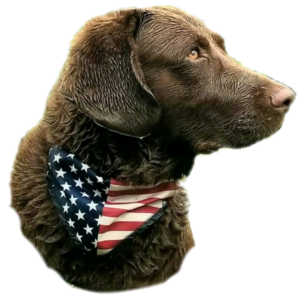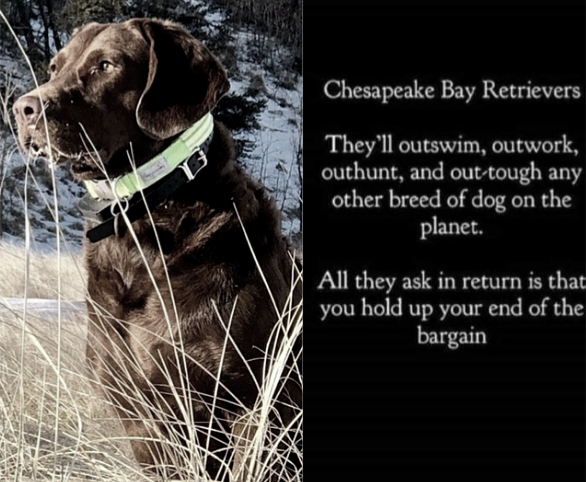Is a Chesapeake Bay Retriever the right breed for you?
We are, of course, quite biased that Chessies are the best breed in the world, but that does not mean they are the right breed for everyone! It is important to know all about the breed before bringing a new puppy into your home. Check out the following resources:

About the Chesapeake Bay Retriever
Chessies are strong, powerfully built gundogs standing anywhere from 21 to 26 inches at the shoulder. A male can weigh up to 80 pounds. The distinctive breed trait is a wavy coat that is oily to the touch. Chessies are solid-colored, either chocolatey brown, sedge, or deadgrass, with keen yellow-amber eyes that nicely complement the coat.
Chessies are more emotionally complex than the usual gundog. Chessies take to training, but they have a mind of their own and can tenaciously pursue their own path. They are protective of their humans and polite, but not overly friendly, to strangers. Chessies make excellent watchdogs and are versatile athletes. A well-socialized Chessie is a confident companion and world-class hunting buddy.
Full Article: https://www.akc.org/dog-breeds/chesapeake-bay-retriever/
The Chesapeake Bay Retriever (often referred to as the Chessie) is a breed that originates from the State of Maryland, where they were developed for their excellent waterfowl retrieval skills. They are a very intelligent, tenacious, loyal, and athletic breed. Unlike their Labrador and Golden Retriever relatives, though, they do not have such easy-going personalities and can be very strong-willed. This means they are not always a good choice for a novice dog owner.
Full Article: https://www.thesprucepets.com/chesapeake-bay-retriever-full-profile-history-and-care-4693502
Chesapeake Bay Retrievers: What’s Good About ‘Em, What’s Bad About ‘Em
The Chesapeake Bay is the most powerful of the retrievers, with the strongest personality.
This rugged dog should be taken hiking and swimming as often as possible. A walk around the block is not nearly enough to maintain his muscle tone or to satisfy his working instincts.
This breed needs a job to do (learning obedience exercises, fetching a stick or ball, canine fieldwork), else he will find his own ways to keep himself busy, and you may not appreciate his choices.
Unlike the more popular Labrador and Golden Retrievers, the Chesapeake is intensely loyal to its family, reserved with strangers, and possesses good discriminatory instincts. Thus, he makes a fine watchdog, but is not usually aggressive toward strangers.
Most Chesapeake Bay Retrievers are fine with the pets in their own family, but can be territorial with strange dogs and cats.
As with all retrievers, you must control his tendency to chew on objects and to mouth your hands. Provide a box filled with toys so he can carry something around in his mouth if he wants to.
Confident leadership and obedience training are required to develop respect. Chesapeakes will test members of the family to find their place in the pecking order. If you don’t take the top position, he will.
Full Article: https://www.yourpurebredpuppy.com/reviews/chesapeakebayretrievers.html

